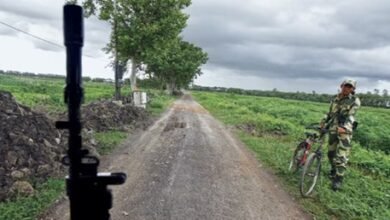The Qosh Tepa Canal: its Impact on Afghanistan and Central Asia.

The Amu Darya River, as a key water source in Central Asia in providing for agriculture and drinking purposes, plays a crucial role in maintaining the ecosystem of the region.
Large-scale project like Qosh Tepa Canal is significant from the geopolitical perspective as it will help to ensure management of water resources and minimize any negative implications. It is important to highlight all the concerns about the absence of water sharing agreements, the potential conflicts among countries that are located on the Amu Darya River basin and the view that Afghan people have full rights to use the river water resources.
The challenges associated with the construction, its impact on both Afghanistan and Central Asian region, the need to evaluate the situation to find a solution that will benefit both the parties, while being harmless for the overall environmental sustainability should be taken into consideration.
Amu Darya
One of the largest rivers in Central Asia, with a rich history and high geopolitical and geoeconomical significance for country-users is Amu Darya. The river is formed by the confluence of the Vakhsh and Panj (Pyandzh) rivers (at which point it becomes known as the Amu Darya) and flows west-northwest. In its upper course the Amu Darya forms part of Afghanistan’s northern border with Tajikistan, Uzbekistan, and Turkmenistan. It then flows across the desert of eastern Turkmenistan and in its lower course forms part of the boundary between Uzbekistan to the northeast and Turkmenistan to the southwest. River has been home to various cultures, empires and civilizations for many centuries and was earlier known as Oxus or Jayhun.
However, the Amu Darya River also faces challenges related to environmental and geopolitical factors. Over the past decades, the water level in the Aral Sea has been declining due to water withdrawal from the Amu Darya for agriculture. This has led to serious environmental problems such as the destruction of fisheries and decreased water quality. And for now, a new element of the problem directly affecting Central Asia is the construction of the Qosh Tepa Canal, which began in early 2022.
Impact on Afghanistan.
The Qosh Tepa project in Afghanistan might have some positive aspects, such as improving to some degree the country’s economy, might contribute to increasing the overall employment rates and reducing the percentage of poverty.
The economic growth. The Taliban expects the project to turn 550,000 hectares of desert into much-needed farmland. An increased percentage of water reserves for irrigation will help expand agricultural activities, producing higher yields. In other words, the implementation of this project is valuable for Afghanistan because it will help them become more self-sufficient and less independent of the assistance of neighboring countries.
Job opportunities. The construction and operation of the canal will create additional employment opportunities for Afghanistan’s population. In addition, the expansion of agricultural activities after canal construction will also contribute to additional work opportunities in the agricultural sector for an even larger population.
Poverty reduction. Increasing agricultural productivity, facilitated by the Qosh Tepa Canal, will have a significant positive impact on poverty reduction. By virtue of fertility gained through the canal, farmers will be able to cultivate more land, increase yields and earn higher incomes.
Still, despite numerous benefits, Qosh Tepa also poses some challenges and risks.
Environmental Concerns. There is a high probability that the canal construction will have negative consequences in that there may be a shortage of water for Central Asian republics and Afghanistan itself even in the short run, affecting ecosystem, agricultural and industrial sectors and water consumption by population.
Relations with Central Asian region. The construction of the Qosh Tepa Canal in the Amu Darya River basin was a unilateral and uncoordinated decision on the part of Afghanistan, and of course did not cause a positive reaction from the Central Asian states. Although international law states that no one can cancel or limit any state in the use of transboundary water resources, it is worth noting that in order to maintain friendly relations between states when using transboundary water resources, it is necessary to take into account the opinions of states that also have the right to use them.
Impact on Central Asian region.
For arid Afghanistan, the construction of the Qosh Tepa canal on the Amu Darya River could be a salvation, but at the same time a threat to water shortages in Tajikistan, Kazakhstan, with the most disastrous effects on Turkmenistan and Uzbekistan, located downstream, writes CabarAsia.[3] The division of water resources, geopolitical implications and competition for resources are causing concern and anxiety among Central Asian countries.
Sharing of water resources. Without water sharing agreements, the Qosh Tepa Canal requires a significant volume of water from the Amu Darya River, which negatively affects the availability of water for downstream countries and the ability to meet the needs of all recipients. According to the assessment of the chief specialist of Scientific-Information Center of the Interstate Commission for Water Coordination of Central Asia (SIC ICWC), Anatoly Sorkin, the construction of the Qosh Tepa canal will lead to the withdrawal of 4-4.5 km³ of water annually and will reduce the total volume of water in the Amu Darya River by 12-13% (from 33 to 28.5 km³). After completion of the canal construction, within some years the average level of water intake in Turkmenistan and Uzbekistan in the middle and lower reaches of the stream will decrease from 80% to 65%.[4] In this case, it is worth noting that the level of water intake in Turkmenistan and Uzbekistan may have significant changes for agriculture and the economy of the countries, leading to the need to reduce irrigated land areas and deterioration of conditions in this type of production. These consequences may increase the likelihood of competition for greater access to resources.
Geopolitical consequences. Issues about resource sharing, especially without usage agreements, could cause tension and misunderstandings between Afghanistan and Central Asian countries. Water resources are of strategic importance to these countries, and disputes in this area could exacerbate existing geopolitical tensions.
Possible Solutions.
When addressing this problem, it is worth first of all to comprehensively study the positive and negative aspects for Afghanistan itself and the regions of Central Asia. The optimal solution should be beneficial for both parties, and also should not be negative when considering the consequences on a global scale.
A thorough environmental and social impact assessment of the project must be carried out. This includes studying the impact on ecosystems, watersheds and local communities. The development and implementation of measures to minimize negative impacts and compensate for possible damage should be an important part of the project.
Additionally, it is important to take into account the economic side of the project. A cost-benefit analysis needs to be carried out to ensure that the construction and operation of the Qosh Tepa Canal will be cost-effective and sustainable in the long term.
It is necessary to promote right thinking and education among the population, including youth and adults. This could include encouraging water conservation and initiatives proposed by youth. Educational programs, campaigns and events should raise awareness of the importance of conserving and efficiently using water resources, as well as the impact on the environment.
Further, it is important to ensure broad participation not only from countries bordering Afghanistan, but also from other states. The water problem is of global importance and the cooperation of all stakeholders is necessary to achieve a sustainable solution. International forums, negotiations and agreements should facilitate coordination and joint efforts in solving the problem.
Regional Cooperation and Diplomatic Efforts.
Regional cooperation and diplomatic efforts play a critical role in addressing problems and finding solutions to the Qosh Tepa Canal problem. It is vital to emphasize the importance of cooperation between participating countries to avoid potential conflicts and ensure equitable distribution of water resources. However, not all Central Asian states that have a common border with Afghanistan are taking action regarding the construction of the canal, and do not give their official position. The most active participant in resolving this issue is Uzbekistan. The President of the Republic of Uzbekistan Shavkat Mirziyoyev on December 20, 2022 emphasized the importance of conducting a dialogue with the interim government of Afghanistan on the basis of international law and the interests of the countries sharing the water resources of the Amu Darya. Also in March 2023, the delegation of Uzbekistan, headed by A. Kamilov, the special representative of the President of the Republic on foreign policy, visited Afghanistan to discuss the construction of the canal.[5]
On September 15, at the International Fund for Saving the Aral Sea Council of Heads of State, the President of Uzbekistan noted that a new participant in the water use process had appeared in the region, and therefore it was proposed to form a joint working group to study all aspects of the construction of the canal and its impact on the water regime of the Amu Darya, as well as consider the issue of involving representatives of Afghanistan in the regional dialogue on the sharing of water resources.
Regarding existing international framework, one that can guide this cooperation is the United Nations Convention on the Law of the Non-navigational Uses of International Watercourses. This convention provides a legal framework for the management and use of transboundary watercourses, emphasizing the principles of fair and reasonable use, cooperation and the prevention of significant harm. Participating countries can use this convention as a basis for negotiations and agreements regarding the Qosh Tepa Canal and the sharing of water resources.
Beyond the international framework, the role of international organizations and stakeholders is critical in promoting dialogue and cooperation between Afghanistan and Central Asian countries. Organizations such as the United Nations, the World Bank and regional organizations such as the International Fund for Saving the Aral Sea (IFAS) can provide a platform for discussion, technical assistance and support for sustainable water management practices. These organizations can help facilitate negotiations, provide expertise in water management, and contribute to the development of joint projects and initiatives.
Diplomatic efforts should be aimed at promoting dialogue, transparency and confidence-building among participating countries. Regular consultations and diplomatic exchanges can create opportunities for open discussions, exchange of information and search for mutually beneficial solutions. It is essential to develop a sense of shared responsibility and common goals in managing the region’s water resources. By emphasizing the importance of cooperation, using international frameworks, and engaging international organizations and stakeholders, participating countries can work together towards sustainable and equitable management of water resources in the region.
Conclusion.
It seems the construction of the Qosh Tepa Canal might hold significance for the population of several provinces of Afghanistan, who are currently facing water shortage difficulties due to undeveloped water infrastructure. This project aims to provide a water supply for agriculture, industries and the local population. At the same time intake of water from Amu Darya may course negative ecological consequences for Central Asian Republics and Afghanistan itself.
However, it is important to acknowledge that building the Qosh Tepa Canal may give rise to geopolitical complexities within the region. The canal passes through countries territories necessitating agreement and cooperation among them for implementation. Given divisions, borders and conflicts in the region achieving this may be challenging. Nevertheless, if all parties involved display a willingness to find common ground through compromise and dialogue the construction of the Qosh Tepa Canal could serve as a model of regional cooperation and diplomatic efforts that transcend political differences while fostering peace and stability.
To minimize the impact of the Qosh Tepa Canal, on both the Central Asian Region and Afghanistan and its inhabitants it is crucial to prioritize water management practices while actively involving all stakeholders. In order to ensure water management, it is crucial to create and execute strategies that consider the requirements of various sectors, like ecosystem, agriculture, industry and the general public. These strategies should encompass initiatives aimed at preserving water enhancing its efficiency and ensuring agreed distribution, among all users.
Tamilakhon Khaydarova
–Important Article on Afghanistan–By High School Student From Tashkent ,Uzbekistan.
—
Ms Tamilakhon Khaydarova,Tashkent,(Uzbekistan):-Article on The Qosh Tepa Canal,its Impact on Afghanistan and Central Asia.
The Author Ms Tamilakhon Khaydarova – is an enthusiastic high school student at “Profi School” Tashkent, Uzbekistan. Born on 28th March 2007, she is known for her unwavering passion for education, leadership and global affairs. Her academic journey has been marked by a consistent display of exceptional achievements and exemplary qualities. Her writing skills have received international recognition, highlighted by a reduced scholarship to the prestigious Harvard Undergraduate International Relations Scholars Program twice, as well as winning the competitive Immerse Education Essay Competitions, securing impressive scholarships against a low acceptance rate. On top of that she is an active participant of numerous Model UN conferences.
She graduated with honors from School of Music and Arts #18, named after P. Tchaikovsky Tashkent, Uzbekistan. Her passion for the arts has nurtured her creativity, discipline, and unique perspective. Also, has a keen interest in the culture, music and dance of India.
—–
(This story has not been edited by News Mania staff )






